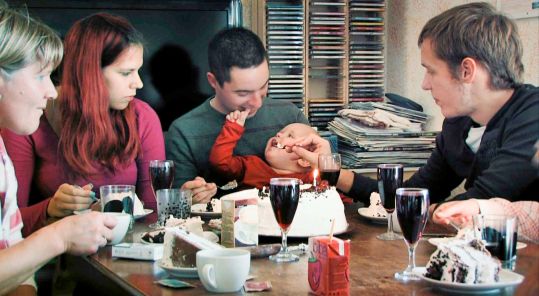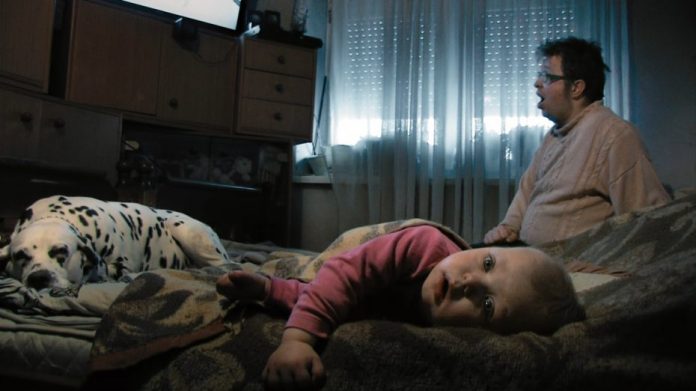(THIS ARTICLE IS MACHINE TRANSLATED by Google from Norwegian)
In the first scene we see the girl Nia come out of her mother's stomach and into the world. The newborn is warmly welcomed by the parents; the nurse places the child close to the mother's chest. The father, who has assisted the mother throughout the birth, is lovingly thrilled at the beauty of the newborn. When the movie ends, about a year later, Nia is taken into another family. Meanwhile, the film portrays a third family: Matej's family, Nias 22 year old father, who has parents with special needs.
Director Rok Bicek and his film crew patiently filmed Matej's life for a whole decade, from his mid-teens to the moment when his courageous attempt to be a good father to Nia disintegrated. The editing is non-linear, which sometimes makes it a bit demanding to grasp the logic behind the director's choices – close-ups and long cuts without cuts, with random zooming and panning. However, it is clear that it is Matej's family that this elaborate, observational documentary is about. And just because this family is extraordinary, it offers a provocative but precise metaphor for any family caught in the discrepancy between the ideal family on the one hand and the family's experiences on the other.
But the real power of this film probably lies in the fact that it touches on the fear and growing insecurity that characterize today's society, as well as the weakening of the welfare state.
The camera's eye. Of all living creatures, Homo sapiens is the least developed at birth. While many animals are able to fend for themselves soon after they are born, human children need the family to survive. Sigmund Freud believed that most of the people's mental health problems are due to traumas from their upbringing in the family. In the early stages of the Soviet Union – when the revolutionaries sought to create a new world – they believed that by eliminating family as a unit, they could contribute to the happiness of the people of this new world. In fact, those who belonged to the elite could send the children away just after they were born, and let them grow up far away from the family, in orphanages. But as it turned out, the residents of these orphanages developed as many mental health problems as the children who grew up in a "normal" family environment.
 The good and bad aspects of belonging to a family are still a challenging topic. Entire cycles of films, like the films of Hirokazu Kore-eda, are devoted to this. While Kore-edas Nobody Knows (2004) and Lasse Hallströms What's Eating Gilbert Grape (1993) challenges the myth of "the good mother", the other exploring the problem of paternity. Most frightening are the films of Vincent Galos The Brown Bunny (2003) and Gaspar Noés Irreversible (2002). In the film of Rok Bicek, professional actors are not used, but it would be wrong, in my opinion, to assume that these protagonists are not acting. In the final scene, where Matej's brother Mitja suggests that they go and listen to music "in Roks car", director Rok is the talk. The crew and the camera, with their always open and registering eye, become an active part of the protagonists' lives, and the film makes no attempt to hide it: we see the protagonists nod to the camera as they enter the room.
The good and bad aspects of belonging to a family are still a challenging topic. Entire cycles of films, like the films of Hirokazu Kore-eda, are devoted to this. While Kore-edas Nobody Knows (2004) and Lasse Hallströms What's Eating Gilbert Grape (1993) challenges the myth of "the good mother", the other exploring the problem of paternity. Most frightening are the films of Vincent Galos The Brown Bunny (2003) and Gaspar Noés Irreversible (2002). In the film of Rok Bicek, professional actors are not used, but it would be wrong, in my opinion, to assume that these protagonists are not acting. In the final scene, where Matej's brother Mitja suggests that they go and listen to music "in Roks car", director Rok is the talk. The crew and the camera, with their always open and registering eye, become an active part of the protagonists' lives, and the film makes no attempt to hide it: we see the protagonists nod to the camera as they enter the room.
Family Press. The film won Critics Week Award at the Locarno Film Festival and Vesna Award for the best full-length feature film at the Portorož Film Festival in 2017. I saw the film in Ljubljana, where several screenings were sold out. Some of the causes are site-specific. For example, Slovenian film has largely shown something completely different from ordinary people, and fathers who feel neglected in national child care guidelines easily identify with Matej. Another significant reason is that The Family, like today's popular media, offers the exhilarating joy of looking into the lives of the underprivileged in society, which we also find in the new Romanian film, and in the recent wave of Italian gangster films.
The once "natural" functions of the family are becoming increasingly difficult to fulfill as the welfare state and the support mechanisms it contains disappear under the pressure of liberal capitalism.
But the real power of this film probably lies in the fact that it touches on the fear and growing insecurity that characterize today's society, as well as the weakening of the welfare state. Matej's frustrated desire to be a good father, as distinctive and personal as it may sound, is also universal. It is echoed in a fairly common experience in today's men and women: in their difficulties in living up to the growing expectations of the family and its responsibility to create a safe and caring environment in a changing world.
Unlike earlier periods, when the family shared its social responsibility with the state and received assistance from various support agencies, the family has now almost become the only unit where safeguarding and restoring their labor takes place. The once "natural" functions of the family are becoming increasingly difficult to fulfill as the welfare state and the support mechanisms it contains disappear under the pressure of liberal capitalism.


